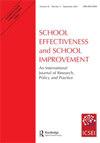学校环境是否与教学质量有关?社会构成、领导、教师合作和学校氛围的影响
IF 2.8
3区 教育学
Q1 EDUCATION & EDUCATIONAL RESEARCH
引用次数: 10
摘要
学校环境对创造成功的学习环境和提高教师教学质量的相关性尚不清楚。在本研究中,我们考察了学校在教学质量(即课堂管理和任务反馈)方面是否存在差异,以及学校之间的差异是否可以用学校特征(即社会构成、学校学术轨迹、校长领导、教师合作和学校氛围)来解释。因此,我们在教师和学校层面对教学质量进行建模,并包括学校环境的多个视角。我们重新分析了德国国际学生评估项目(PISA) 2003年的数据,得出了来自198所学校1,939名教师及其校长的数据。多层次分析表明,学校教学质量存在系统差异。这些差异与社会构成、校长领导、教师合作和学校氛围有关。因此,学校有可能提高教学质量。然而,教师对学校特色的看法比校长的看法更相关。本文章由计算机程序翻译,如有差异,请以英文原文为准。
Is the school context associated with instructional quality? The effects of social composition, leadership, teacher collaboration, and school climate
ABSTRACT The relevance of the school context to creating a successful learning environment and promoting teachers’ instructional quality is not yet clear. In the current study, we examine whether schools differ in aspects of instructional quality (i.e., classroom management and task feedback) and whether differences between schools can be explained by school characteristics (i.e., social composition, school’s academic track, principals’ leadership, teacher collaboration, and school climate). Therefore, we model instructional quality both at teacher and school level and include multiple perspectives on the school context. German Programme for International Student Assessment (PISA) 2003 data were re-analyzed, resulting in data from 1,939 teachers and their principals in 198 schools. Multilevel analyses revealed that schools differ systematically in their instructional quality. These differences were related to social composition, principals’ leadership, teacher collaboration, and school climate. Accordingly, schools have the potential to promote instructional quality. However, teachers’ perceptions of school characteristics are more relevant than those of the principals.
求助全文
通过发布文献求助,成功后即可免费获取论文全文。
去求助
来源期刊

School Effectiveness and School Improvement
EDUCATION & EDUCATIONAL RESEARCH-
CiteScore
6.60
自引率
0.00%
发文量
23
期刊介绍:
School Effectiveness and School Improvement presents information on educational effectiveness, practice and policy-making across primary, secondary and higher education. The Editors believe that the educational progress of all students, regardless of family background and economic status, is the key indicator of effectiveness and improvement in schools. The journal strives to explore this idea with manuscripts that cover a range of subjects within the area of educational effectiveness at the classroom, school or system level, including, but not limited to: •Effective pedagogy •Classroom climate •School ethos and leadership •School improvement and reform programmes •Systemwide policy and reform
 求助内容:
求助内容: 应助结果提醒方式:
应助结果提醒方式:


